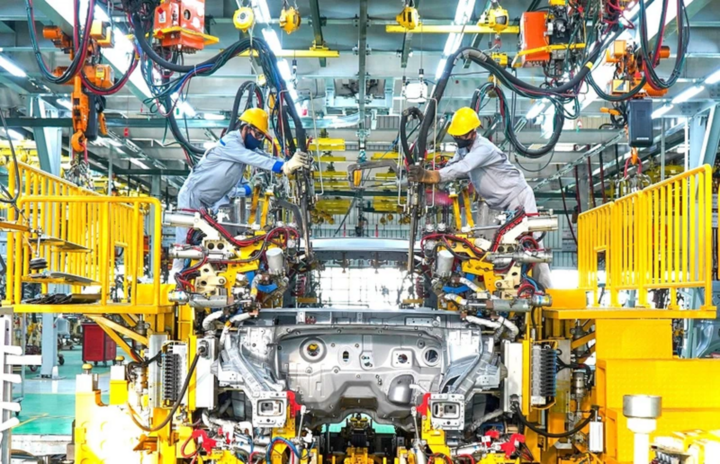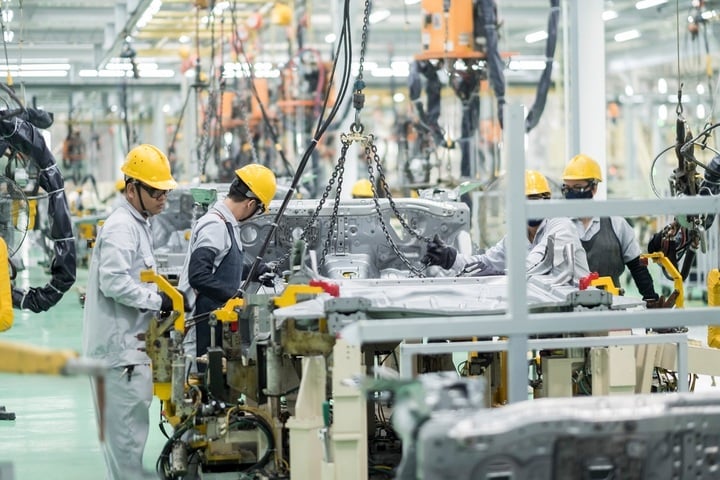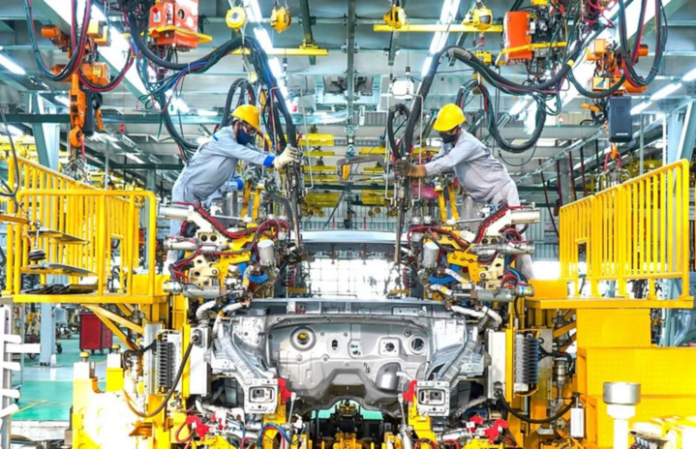According to Dr. Mac Quoc Anh, Vice President of the Hanoi Association of Small and Medium Enterprises (Hanoisme), in the context of the country’s efforts to promote renewal and develop a socialist-oriented market economy, legitimate wealth creation is not only the right but also the responsibility of every citizen, especially entrepreneurs and enterprises – the forces directly creating material wealth for the country.
“In the history of global economic development, there has never been a powerful nation without a strong class of entrepreneurs who know how to create wealth, and Vietnam is certainly no exception,” he said.

Leaders who know how to create wealth will positively inspire their subordinates.
Notably, Mr. Quoc Anh emphasized that enterprise leaders – as the “captains” steering the economic ship – cannot stay out of the wealth creation “race,” nor can they afford to be content or cautious about taking risks. Doing so will only cause enterprises to miss out on growth opportunities and fall into stagnation or, worse, a state of asset depletion.
“If the leader does not change their mindset and methods to create wealth for the enterprise but instead remains in their comfort zone, afraid of change and reluctant to take responsibility, the enterprise will not be able to develop and will eventually lag in the fierce market competition,” he added.
“In today’s world, the concept of ‘entrepreneurial builder’ is often mentioned – meaning those who not only create wealth for themselves but also generate value for society, the community, and the economy,” he continued.
“This mindset needs to be strongly encouraged in Vietnam so that each enterprise is not just a production and business entity but also a ‘healthy cell,’ contributing to the country’s sustainable development and prosperity,” Mr. Quoc Anh further emphasized.
“Therefore, an enterprise leader who does not dare to create wealth is abandoning their historical role in the country’s development. In my opinion, such a person is not worthy of being an enterprise leader in this new era,” he concluded.
An enterprise leader who does not dare to create wealth is abandoning their historical role in the country’s development.
Mac Quoc Anh
However, Mr. Quoc Anh stressed that enterprise leaders should not focus solely on creating wealth for themselves or their businesses but must also have a spirit of community service.
He provided evidence from reality in Vietnam and worldwide: sustainable enterprises always link personal interests with collective and community interests. For example, large corporations such as VinGroup, Viettel, and FPT always aim to reach international standards to help Vietnamese brands compete globally.
This aspirational wealth creation with a sense of service has driven these enterprises to dare to overcome challenges and constantly innovate to grow. As a result, they have conquered the “big sea” and become increasingly strong and wealthy.
Conversely, enterprises operating with a selfish mindset, focusing only on personal interests, often face internal instability, strategic confusion, and a lack of attractiveness to investors, partners, and employees. Such enterprises will not be able to sustain their development.
Sharing the same view, delegate Ha Si Dong (from Quang Tri) analyzed that, from an enterprise perspective, if the leader does not know how to create wealth, they cannot inspire or motivate their subordinates to do the same. This will result in a stagnant, unmotivated, and uncommitted team.
More dangerously, a leader’s lack of wealth creation mindset or their refusal to embrace this aspiration due to fear of risk, mistakes, or a sense of responsibility avoidance can hinder the enterprise’s development and even lead to stagnation.

To inspire subordinates to create wealth and contribute to the enterprise, the leadership team must know how to create wealth and strive for it.
“Imagine an enterprise with a talented leader, coupled with a thirst for wealth creation and a growth mindset. They will constantly think and learn to find new directions to help the enterprise develop most efficiently and effectively,” Mr. Dong explained.
“They will not be satisfied with what has been achieved but will seek ways to make those achievements even greater and more profitable for the enterprise. With the leader’s ability and determination to create wealth, the enterprise will thrive,” he added.
“On the other hand, if the leader does not know or does not want to create wealth, they will settle for what they have achieved, resist change, and easily miss valuable opportunities in the fierce competition. Such an enterprise will undoubtedly operate stagnantly and, if prolonged, may even face the risk of falling behind and going bankrupt,” he further warned.
Always thinking of new ways to create wealth
Delegate Nguyen Thi Viet Nga (from Hai Duong) also shared her thoughts: “If the head of an enterprise does not know how to create legitimate wealth, the enterprise will not develop, and subordinates will not be able to rely on them. As a result, their attachment to the enterprise will not be sustainable.”

Delegate Nguyen Thi Viet Nga
“Many enterprises have gone bankrupt or dissolved due to a complacent mindset, while the modern trend is constant innovation. As competitors accelerate and find ways to grow, standing still means falling behind. So, when an enterprise leader does not know how to create wealth, it will undoubtedly affect their subordinates, making it difficult for them to have wealth creation opportunities and even risking job loss or unemployment if the enterprise goes bankrupt,” Delegate Nga stated.
As a business leader, Mr. Nguyen Hoang Phuoc, Deputy Director of An Khe Sugar Factory (in Gia Lai), under the Quang Ngai Sugar Joint-Stock Company, acknowledged: “To inspire subordinates to create wealth and contribute to the enterprise, the leadership team must know how to create wealth and strive for it, accepting risks.”
“In today’s market mechanism, if enterprise leaders do not aggressively change their production and business mindset, dare not to innovate and create, they will not be able to compete with other rivals. This will inevitably lead to economic decline, causing difficulties for the enterprise and, consequently, for subordinates and employees,” Mr. Phuoc said.
“Additionally, a leader who is not dynamic and does not know how to create wealth will result in a stagnant system, a weak enterprise, and dependent subordinates,” he added.
Therefore, according to Mr. Phuoc, in response to the Prime Minister’s call, enterprise leaders need to take the initiative in wealth creation. Those who have already created wealth for their enterprises and the country should not stop but continuously seek new methods and directions to achieve even greater success. Meanwhile, those who do not know or do not want to create wealth must quickly discard this mindset and join the community’s general trend to avoid being eliminated.
“Each legitimate entrepreneur and enterprise that creates wealth will contribute to the country’s economic development. Only then will the goal of double-digit growth be achieved soon,” Mr. Phuoc emphasized.
Let’s Get Rich: The Prime Minister’s Call for a National Movement to Prosper
“At the National Conference on the implementation of Resolution 68, the Prime Minister emphasized the need to dismantle prejudices and recognize the private sector as the most important pillar and driving force of the economy. He stressed the importance of vigorously promoting a culture of entrepreneurship, innovation, and international integration.”
“The Rise of an Industrial Powerhouse: A Real Estate Boom Like No Other”
According to Mr. Le Dinh Chung, CEO of SGO Homes and a member of the VARS market research task force, Hung Yen will continue to be a hotspot for investors. With the strong presence of major real estate developers and the expansion of industrial zones to a massive 9,200 hectares, the area is set to thrive under the spotlight.
The ‘Super Typhoon’ Yagi and the Unforgettable: A Tale of Providing Clean Water to Flood-Ravaged Regions
The devastation wreaked by Typhoon Yagi had far-reaching consequences, with severe flooding leading to widespread contamination of drinking water sources. This posed a significant threat to the health of those affected. As a result, providing clean water to the flooded areas became the top priority.





















